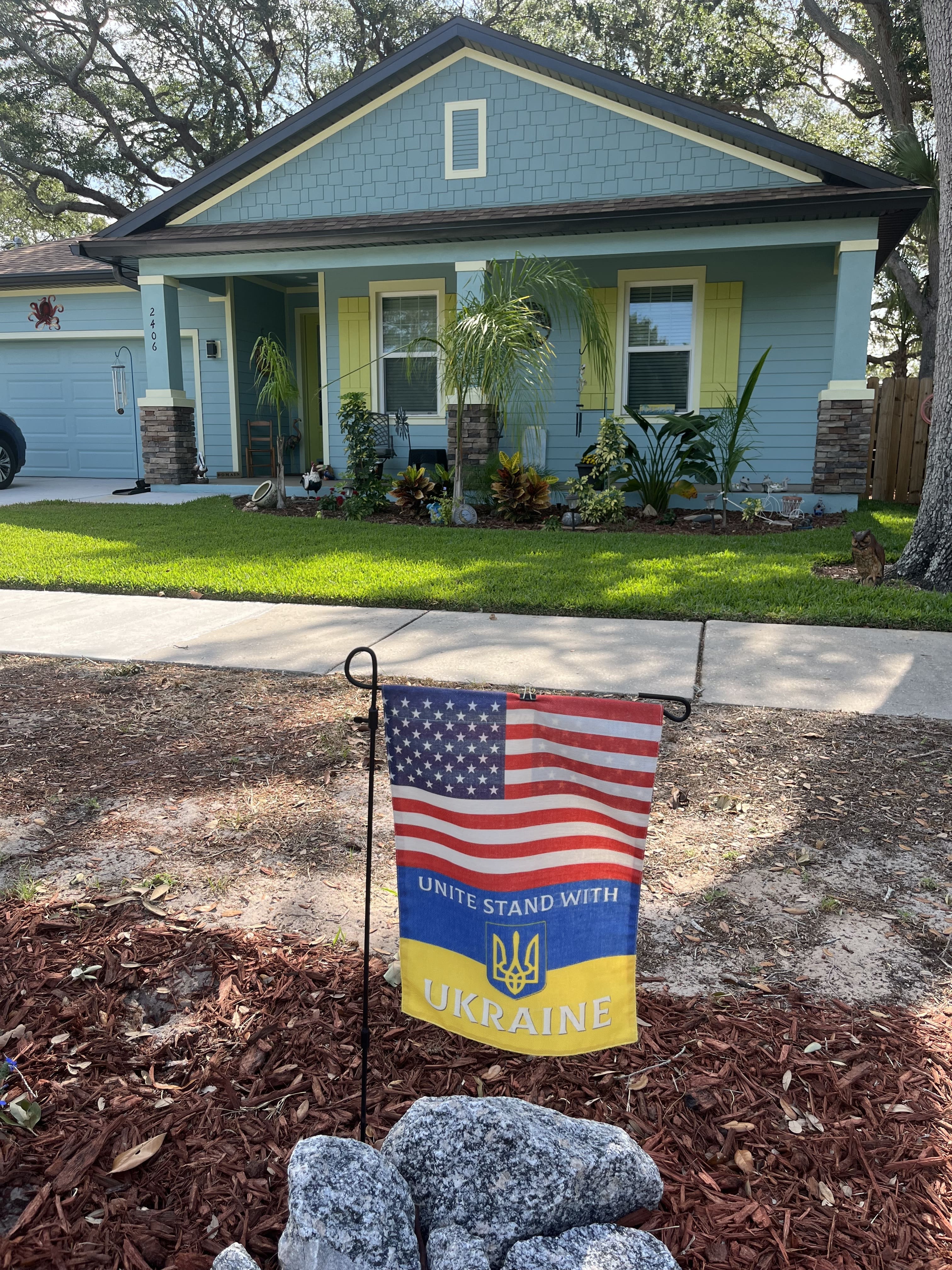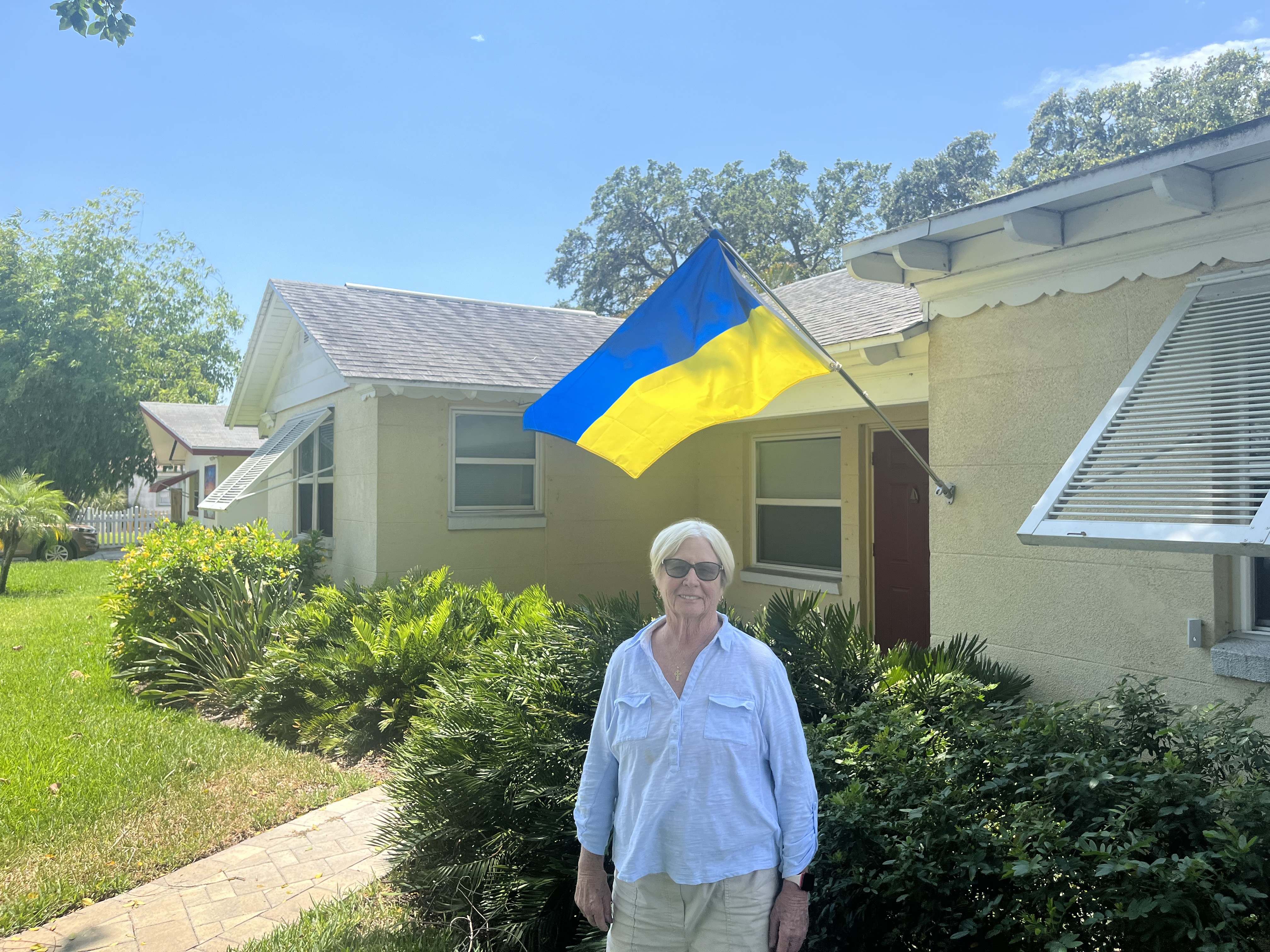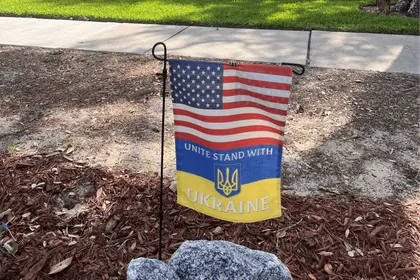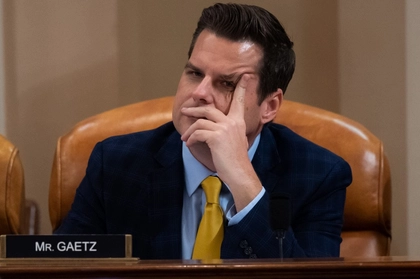As you drive around the coastal neighborhoods of Pinellas County, Florida, the blue-and-yellow Ukrainian flags are hard to miss, hanging from hundreds of sun-bleached cottages in this once predominantly Democratic district along the Gulf of Mexico.
But despite its seeming support for Ukrainian sovereignty, this populous and increasingly populist community is just a small electoral microcosm of the American South. This historically Democratic district has recently turned Republican, backing leaders who have soured as of late on aid to Kyiv.
JOIN US ON TELEGRAM
Follow our coverage of the war on the @Kyivpost_official.
Politicians leading the charge
The Congressional district is now represented by Anna Paulina Luna, a freshman Republican who has been questioning, loudly, the American dollars sent to Ukraine’s defense.
“We have gone above and beyond other NATO countries in terms of sending money to Ukraine,” Rep. Luna said to right-wing TV outlet Newsmax in February., “When people are talking about sending more money to Ukraine, you know, anyone watching this program, when you go to Publix [a Florida grocery chain] or Walmart, you look at the price of eggs right now and it’s close to eight dollars, and so to talk about sending more money overseas, it’s just something we can’t afford to do.”
With about 22 million people and growing rapidly, Florida is the third-most populated state in the US and historically a bellwether for American presidential politics: a purple state that has been leaning red – that is, Republican – in recent years. It is the residence of former US President Donald Trump and his presumed but unannounced Republican presidential rival in 2024, Florida Governor Ron DeSantis, as well as a host of younger, maverick politicians who are trying to appease the ultra-conservative base that both of these would-be presidents are trying to win over.

Team Biden Resorts to ‘Not My Fault’
Pinellas County is also, incidentally, DeSantis’ childhood home. The governor recently wrapped up a world tour through Asia, the Middle East and the UK, shopping out his nascent foreign-policy thoughts on about China, and reducing US aid to Ukraine.
After describing the war in Ukraine to Fox News in April as a “territorial dispute” and not “a vital national security interest,” DeSantis has found himself backpedaling.
According to the Washington Post: “As the criticism mounted, including from major donors, the potential 2024 presidential client quickly clarified that Russia had invaded and that Russian President Vladimir Putin was a war criminal. But in a private conversation, the governor celebrated the controversy as a win, according to one conservative policy leader who met with him in [the Florida state capital] Tallahassee.”
Perhaps more poignantly, Florida is also home to two junior but seated US representatives who have been spearheading what has seemed thus far a quixotic effort to squash America’s commitment to Ukraine: namely, Luna, the first-term Congresswoman from Pinellas County, and Matthew Gaetz, from the very conservative northwest Florida Panhandle, along the border with Alabama.
On April 20, Luna and Gaetz joined 16 other US representatives (half of them from the South) and two US senators in signing a letter to President Joe Biden, which called for an immediate diplomatic conclusion to the war, and a stop to the “open-ended” funding of military aid to Ukraine.
“While the pace of our aid would suggest otherwise, the US is in no position to expend $113 billion reinforcing a foreign military as our own military atrophies,” the letter reads. “Time and again, the executive branch has used debt as a tool to finance foreign wars to the detriment of the American taxpayer… To prop up a foreign government that is historically mired in corruption while the American people suffer from record inflation and a crippling national debt is wildly irresponsible on its own – but to do so while our military contends with aging weapons systems and depleted stockpiles is disgraceful.”

Ukrainians in Florida
The west coast of Florida is home to a small but growing Ukrainian community. Traditionally, Ukrainians in the US have been staunch Republicans, especially during the Cold War.
Roman Voloshyn is a Ukrainian-born businessman and owner of the St. Petersburg, Florida restaurant, Pierogi and Martini Bar. Before his interview with. Kyiv Post on May 2, he had never heard of his congresswoman, Luna, but he has now.
“They do not understand. These people are ignorant. They have ignored history,” Voloshyn said when asked about Luna’s comments.
A self-described Reagan Republican and a Ukrainian banker who grew up in Lviv, not too far from the Polish border during the Polish Solidarnosc movement in the 1980s, Voloshyn and his family came to America in 2002. He was incredulous about his congresswoman’s comments to Newsmax.
“Imagine this is 1939, and the Holocaust has already started. The same thing is happening in Ukraine. This is a genocidal war. It’s an existential war. Just like in World War II, very similar things are happening in Ukraine. Take Bucha, for example, the Russians are killing people simply because they are Ukrainian,” he said.
“And what does the price of eggs have to do with anything, when millions of people are being killed?” Voloshyn added. “How can you compare that to what is happening on a global scale?”
Riding Trump’s slipstream
His comments are very similar to those offered by convicted Trump associate and Ukrainian businessman Lev Parnas in an interview with Kyiv Post in late February, while on under house arrest in Boca Raton, Florida.
“You have to understand that the people in the group you’re talking about [Gaetz, et al.] haven’t traveled outside of the US, and certainly not to Ukraine,” said Parnas, who is now a harsh critic of Trump.
“They simply don’t comprehend the magnitude and severity of the situation. So, their motivation is isolationist, inward-looking and ultimately, self-serving… Of course, all of them are Trump ideologues and will do anything not just to please him, but to bring him back to power.”
So where are these votes coming from in this erstwhile Democratic haven on Florida’s Gulf Coast, and who tacitly provides the mandate for these isolationist views?
In a quick survey of four men at a St. Petersburg sports bar who wore American flags on their hats and identified themselves as US Army veterans, none of them offered to volunteer their thoughts on whether the US should be supporting Ukraine.
“That’s just something I like to keep to myself,” one of the bearded men said.
Jazlin Staeden, a server at that same sports bar, called Whiskey Wings, said that a Ukrainian friend of hers is housing five refugees in her house in Tennessee. But Staeden added, “As for me, I know we need to help people, but I’m on the fence about the whole thing.”
Sophia Fall, another waitress there, said, “I think the US has a long history of sticking their nose in business that’s not theirs.”

Voloshyn quietly said that he has registered a downturn in his pierogi business since the onset of the Russian invasion and assumed that some local residents have frowned upon supporting local Ukrainians. And while he hadn’t heard his congresswoman’s comments prior to the interview, he certainly had heard DeSantis’s remarks.
“That was a kick in the groin,” Voloshyn said. “The Republican Ukrainian community is disgusted by his comments. I went to a Ukrainian church recently and the community there was like, ‘“Who is this guy?’”
“It would help if DeSantis came to visits us. Maybe I can give him some ideas. I have a 52-seat banquet room here, he can have a meeting here, and maybe he can get some education on this war. This is an existential war,” Voloshyn said.
You can also highlight the text and press Ctrl + Enter






